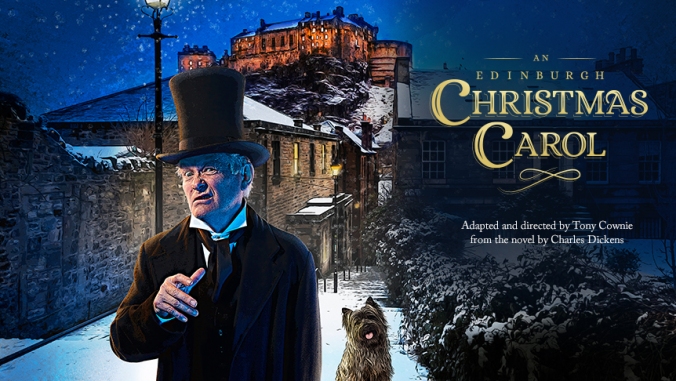
People often associate theatre as a home for serious intellectual exercise. A place to be challenged politically, ideologically and linguistically. But that is to miss the point. Because Mark Thomson constantly espouses his theory that when all is said and done theatre is about entertainment. Sure big ideas can be shared (take Copenhagen from two years ago for instance) but let’s not forget that for £20 spent on a night out people want to enjoy themselves, not just have a brain training workout.
Few congregating places achieve all of these things so effectively.
In cinema one is limited by its lack of engagement physically. Cinema, although for many the centre of their art world, is distant, even unattainable. Art Galleries, although more involving, lack dimension; in most cases the work is done and dusted and we, the audience, come along to wonder at its craft or thinking. We do not take part. The church is too often the home for hectoring and instruction rather than involvement.
So that leaves theatre. Theatre is visceral, real and involving. In this play there are moments of soliloque and sheers pantoesque interaction that acknowledge the involvement of the audience. Then of course there’s the collective laughter, cheering and applause.
Educating Agnes is pure entertainment and sits alongside a number of recent balls-out, have a bloody good laugh evenings in Grindlay Street: Irma Vep, Earnest and The Beauty Queen of Leenane stand out in this respect. But none of them had me quite as out of control as this absolute raucous beast of a comedy. I was literally sweating with laughter.
“Shut up” my wife hissed on three or four occasions, digging me sharply in the ribs, as I exploded, yet again, with laughter at this script and performance that fit together symbiotically.
It’s part slapstick; and for that to work as well as it does we have to invite Scotland’s finest stage comedy actor, Steven McNicoll, to stand forward.
He only has to enter stage left to have me grinning from ear to ear. This man is a legend I tell you. Like a huge Norman Wisdom or a latter day Rikkie Fulton he lives and breathes comedy. Just the way he stands, the way he walks, or the way, in this show, that he uses gaping, inordinately long pauses
to
deliver
a
killer line makes him a diamond.
I don’t know if Liz Lochhead wrote the part with him in mind but if she didn’t there was some divine intervention and certainly the hand of Tony Cownie at play.
To pair him with Kathryn Howden was another stroke of casting genius. The pair are bawdy and gut bustingly funny from start to finish. The scene where they attack Arnolphe with a salmon and a string of sausages will live long in my memory. And, OMG, when the slapstick scene erupts with pantomime door effects I swear I was going to actually micturate.
Now, did you see what I did there? I mixed OMG with an olde worlde term like micturate, and that is the secret of Liz Lochhead’s success. She’s our Makar you know, and a Makar is described thus in Wikipedia;
It especially highlights the role of the poet as someone skilled in the crafting or making of controlled, formal poetry with intricate or involved diction and effects.
That description aptly summarises this show. It’s an epic poem with more wordplays than a session in coalition. The way Liz Lochhead can drop out of a Scot’s rhyming couplet drawn from 17th Century French and retort with a cool “Whatever.” The way a heartfelt monolgue on love, loyalty and obedience can be met with a solitary middle finger pointing to the roof rafters is jaw dropping. It’s also excruciatingly funny. This is writing like nobody else does and it’s something to very greatly treasure.
But this is not just a Liz Lochhead beast. She could never have brought this to bear without the utterly brilliant direction of Tony Cownie. Every line has a nuance and an opportunity to wring an extra laugh out of it by some frm of physical theatre; a look, a posture, a harumph here or there. It’s these that bring it so explosively to life and was what made Liz Lochhead giggle throughout at her own creation (I sat behind her last night so saw how much she was enjoying Cownie’s interpretation. In particular I think she appreciated (as my wife did) the careferee and niaive abandon with which Mark Prendergast literally threw himself into the role of Horace.)
I liked his performance a lot, as I did McNicoll, Howden and Nicola Roy as the eponymous heroine.
But I’m saving the best for last.
Peter Forbes as Arnolphe performed as commandingly as anyone I’ve seen on this stage in recent years. He stands alongside Stanley Townsend, in A view From The Bridge (for me at least), in this respect.
On stage for almost the duration and with at least 50% of the dialogue he never put a foot wrong. But much more than this, the interpretation he put into poor old Arnolphe’s twisted character, the labyrinthine logic that he applied to the morals and ethics of creating a concubine out of Agnes and the despair that ensues as it all goes horribly wrong is expressed through shrieks, hollers, quasimodo-like grimaces and bodily twists and turns that make you squirm in your seat.
He is epic.
This show is epic.
This show is stone wall, nailed on five star quality.
If you miss it, and you’ve read this, then frankly I despair.
Aye, away and boil yer head, innit?









